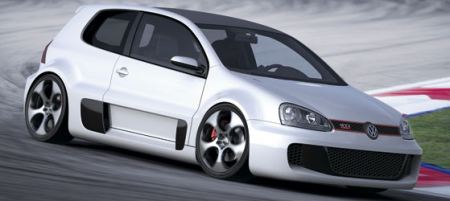Old man Volkswagen celebrates 70th

German automaker Volkswagen is celebrating its 70th anniversary, and we were sent a brief history of the company that Hitler once controlled. It was once a “people’s car” company, and remains so in Europe, but not exactly around here. Shown above is their latest Golf prototype, packing a 650 hp W12.
From very modest beginnings “Gesellschaft zur Vorbereitung des Deutschen Volkswagens mbHâ€, established in Berlin on May 28, 1937 with a share capital of 480,000 Reichsmark, has become one of the world’s largest automakers with headquarters in present-day Wolfsburg.
With the company founded by “Deutsche Arbeitsfrontâ€, the National Socialists instrumentalised the vision of a “Volkswagen†(people’s car) which had fascinated automobile engineers and the public since the turn of the century. Ferdinand Porsche was commissioned by the German automobile industry association to design such a car in 1934 and together with his team of Karl Rabe, Franz Xaver Reimspieß and Ferry Porsche developed a standard production vehicle in 1938 with an inimitable silhouette which was to write automobile history a million times over.
Ferdinand Porsche and Bodo Lafferentz, a representative of “Deutsche Arbeitsfrontâ€, belonged to the management of the company renamed Volkswagenwerk GmbH in 1938. The foundation stone for the factory in present-day Wolfsburg was laid on Ascension Day 1938. However, the car christened “Kraft durch Freude-Wagen†remained just as much a propaganda ploy as the exemplary working and living conditions in the two main plants located in what was then called “Stadt des KdF-Wagens†and in Brunswick. When the Second World War began, the Volkswagenwerk was converted into an armaments factory and the workforce chiefly comprised foreign forced laborers coerced into Hitler’s war.
The British military government turned the Volkswagenwerk seized by the Allies into a civilian automobile production plant, commissioning the first 20,000 Volkswagen saloons in August 1945. Standard production began in December 1945 with the assembly of the first 55 vehicles.
The British also brought with them to the factory on the Mittellandkanal a close-knit customer service and dealer organisation, the quality policy typical of Volkswagen, the focus on exports which was so crucial to economic success, and worker representation. The 1948 currency reform and the normalisation of foreign trade relations conclusively put the appealing Beetle on the road to growth.
The British transferred Volkswagen to the trusteeship of the Federal German government and the administration of the State of Lower Saxony in October 1949, and the company with its Beetle and Transporter models became a symbol of the German “Wirtschaftswunder†(economic miracle). In the 1950s, new factories were opened in Hanover and Kassel, and later in Emden and Salzgitter. The company also went from strength to strength abroad: exports began in 1947, Volkswagen established its first foreign sales company in Canada in 1952, the production company “Volkswagen do Brasil Ltda.†followed in 1953. Wolfsburg celebrated the production of the one millionth post-war Volkswagen in 1955.
Renamed, converted into a joint stock company and partially privatised in 1960, Volkswagen evolved into a German automotive group, taking over Auto Union GmbH in 1965, which was combined with NSU Motorenwerke Aktiengesellschaft in 1969 to form the present-day Audi AG. Between 1973 and 1975, Volkswagen mastered the transition from air-cooled rear engines to modern vehicle concepts featuring water-cooled engines and front-wheel drive. Passat, Golf and Polo are the names given to the three models which today still represent the heart of Volkswagen.
In the mid-1970s, Volkswagen redefined its identity, adapting its organisation and its products to changed global economic conditions in the wake of the first oil price crisis in 1973 and becoming an innovative volume automaker catering for the growing demand for safety, and offering low-consumption engines. As in the Beetle era, Volkswagen today still acts the world over as Germany’s friendly mobility ambassador, contributing to the democratisation of safety, comfort and environmental compatibility.
Born and bred in Lower Saxony, early internationalisation, for example by entering the Chinese market in 1982, proved a key to success. Against this backdrop, Volkswagen was also able to adapt effectively to globalisation by bundling its financial services in Volkswagen Financial Services AG. Production of over 107 million Volkswagen is an achievement that speaks for itself. Volkswagen Aktiengesellschaft also serves as the parent brand for other automotive brands such as Seat, Å koda, Bentley, Bugatti and Lamborghini, all offering attractive models to suit every taste as part of the Volkswagen Group.
The fact that Volkswagen was not only able to repeat the success of the Beetle with the Golf, but even surpass this achievement, ranks among the miracles of Wolfsburg which also include the new start under the British and the rebirth in the mid-1970s.
There are no comments. Be the first!